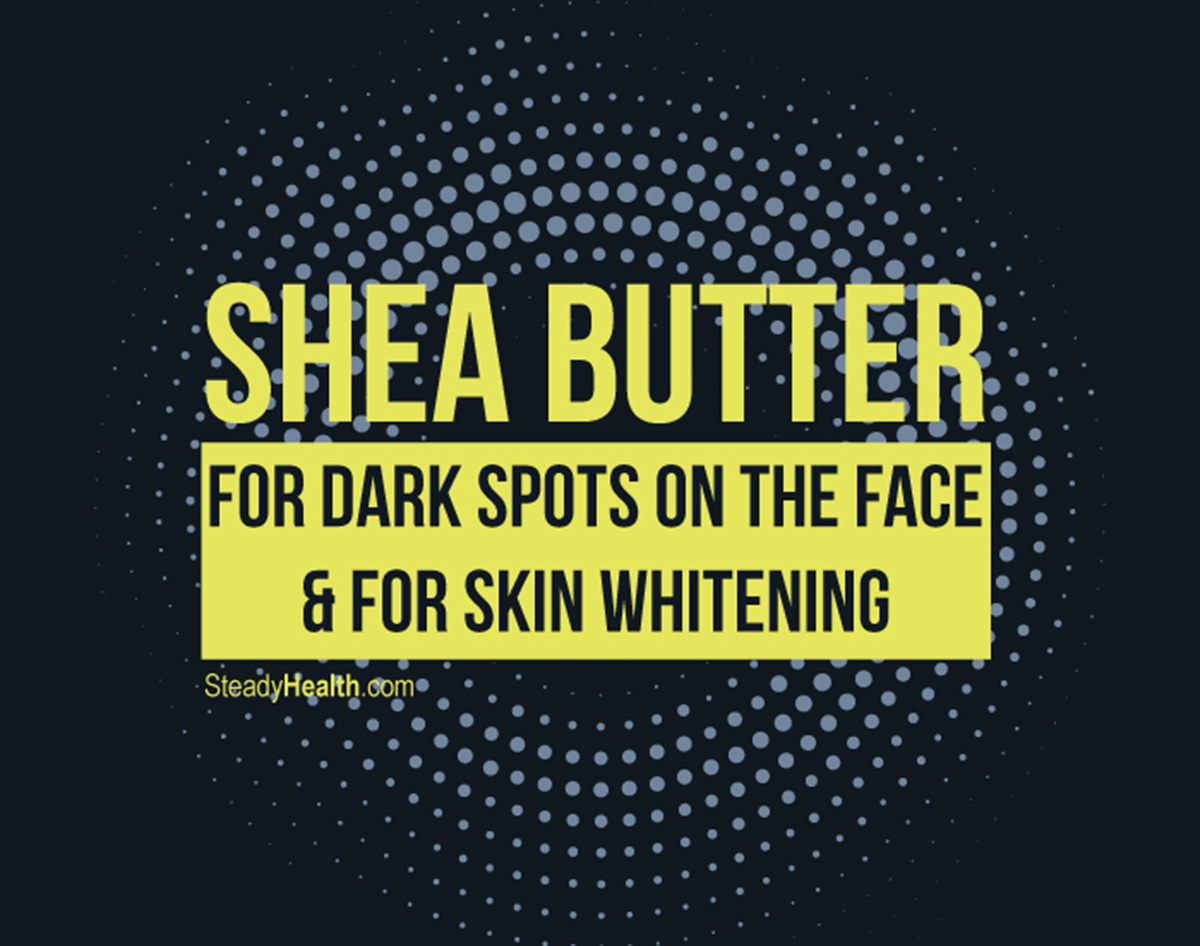Are you dealing with dark spots on your facial skin, caused by hyper pigmentation? Are you hoping to generally brighten your skin, even though you don't suffer from hyper pigmentation? If you're looking for a natural way to go about this, you may well have read that shea butter can help you get rid of your dark patches and brighten your skin.

What Causes Skin Discoloration?
Dark patches on the face can be caused by a number of conditions:
- Melasma is a kind of hyper pigmentation that typically strikes the forehead, cheeks, the nose, the chin, and the upper lip ("mustache area"). Hormonal changes play a role in its development, which is why it is more common in women than in men. When melasma occurs in pregnancy, it is also referred to as chloasma or a "pregnancy mask". [1]
- Post inflammatory hyper pigmentation occurs in reaction to an injury, including as the result of acne vulgaris and eczema. [2]
- Erythromelanosis follicularis originates in the follicles and likewise leads to dark spots on the face, as well as redness. [3]
- Age spots, also called liver spots, can appear in places such as the face and hands with age but also in some younger people. They have a hereditary component and are aggravated by sunlight, as are many other pigment disorders. [4]
Can Shea Butter Naturally Help Treat Dark Spots On The Face?
Go to a dermatologist, and you'll likely find them suggesting fairly extensive as well as expensive procedures such as dermabrasion, cryotherapy, laser resurfacing, and chemical peels to you. You may be open to undergoing these procedures or not. In either cases, you may be on the look-out for more natural treatments for your facial hyper pigmentation, whether as a stand-alone treatment or a supplementary treatment.
The benefits of shea butter are quite varied — if it can help with acne, eczema, signs of aging, and dry skin, mostly due to its anti-inflammatory and antioxidant action [5] — could shea butter help you get rid of dark spots on your face as well?
Vitamin E has been found "effectively to treat melasma and pigmented contact dermatitis", one study found, adding that it is a "highly effective depigmenting agent" [6]. Shea butter, of course, has no shortage of tocopherols, a group of antioxidants better known as vitamin E [7]. Assuming that shea butter can help you with the dark patches on your face isn't so strange, then!
One study indeed found that a cream containing shea butter, among other things including Rumex extract, led to an improvement in hyper pigmentation that developed as the result of varying causes. The study concluded that cosmetics play an important role in the treatment of pigmentation disorders. [8] Another case study describes a woman who used shea butter to even out her skin tone [9].
While there is no scientific research that suggests that shea butter can specifically help fade acne scars, the fact remains that shea butter's anti-inflammatory action combined with its vitamin E content means it may help you in this area.
Does Shea Butter Work For Skin Whitening?
The reasons for which many people, especially women, want to whiten or lighten their skin are rather complex (see: Why do dark women want to be whiter, and light women darker?) and we won't get into the politics of that here. What I can say is that there is no evidence that shea butter specifically whitens the skin, for those people who are interested in achieving that. What shea butter does do is provide excellent moisturization, making it a wonderful option for anyone with dry skin, whether caused by exposure to harsh winter weather or bright sunlight and UV rays, or xerosis [10].
Shea butter can also, as anyone who has ever experimented with making their own skin care products will have discovered, serve as an excellent base for other, new products. Turmeric has skin-brightening properties, for example [11], as do lemon [12] and ginseng [13]. There is absolutely no reason you shouldn't make your own skin-lightening cream using shea butter — which apparently does help even out skin tone and helps remove darker patches, making it a desirable ingredient — as a base. It's certainly going to be better for your skin that any members of the illegal skin-bleaching cream group. These illegal creams tend to contain things like hydroquinone, tretinoin and corticosteroids, and can be toxic as well [14].
The Bottom Line
If you suffer from hyper pigmentation on your face and aren't going to turn to more expensive and invasive methods no matter what, you have absolutely nothing to lose by applying shea butter onto your skin. Shea butter is certainly among the best natural oils and butters to use as facial moisturizers, especially if you have dry skin, so it will hydrate your skin and make it feel silky smooth if nothing else.
Anyone who is desperate for measurable results as soon as possible may wish to choose treatments for pigmentation disorders that are more strongly proven to deliver what you're looking for, however.
- Photo courtesy of SteadyHealth.com


Your thoughts on this